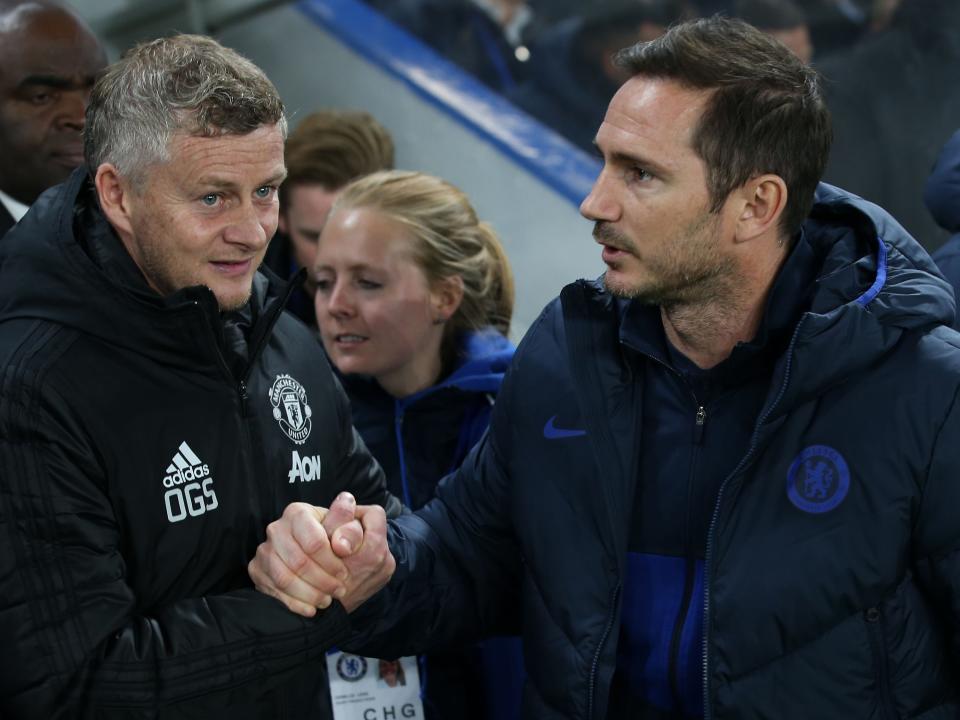Ole Gunnar Solskjaer vs Frank Lampard: Who is doing the better job?

During the first half of last season, any criticism of Ole Gunnar Solskjaer at Manchester United had an easy rebuttal: what about Frank Lampard at Chelsea?
How was it that Lampard had “all the answers” - as Roy Keane put it in a heated debate with Jamie Carragher on Sky Sports back in January - when he was only a handful of points above Solskjaer at the time?
And likewise, as Chelsea’s early season form deteriorated and they stumbled over the line to qualify for the Champions League, Lampard’s advocates could ask: what about Solskjaer?
Was United’s post-lockdown resurgence and third-place finish – above Chelsea on goal difference – not evidence that managers like Solskjaer and Lampard need to be given time in order to get their ideas in place and gradually turn results around.
Solskjaer versus Lampard was and still is an easy comparison to make: two club legends in their first full seasons in charge, overseeing significant rebuilding projects despite relatively little Premier League managerial experience.
Of course, things were still a little more complicated than that. Context is necessary in both cases.
So yes, Lampard was appointed and immediately had to contend with a transfer ban and the loss of his most important player. And yes, Solskjaer’s attempts to rebuild the United squad have been hindered by recruitment failures above him.
Nevertheless, these are Premier League’s biggest-spending clubs in each of the last two summer transfer windows – United in 2019, Chelsea in 2020 – and as their managers prepare to meet at Old Trafford this evening, there is a sense that both could be doing better.
If the comparisons between Solskjaer and Lampard felt premature last season, there is greater legitimacy to them now. Both have had a full season, both have started to mould their respective squads in their image, and we have seen enough from both managers to know what to expect.
Of the two, Solskjaer has the superior record across all competitions. Despite losing an FA Cup semi-final to Chelsea in July, United reached another two semi-finals last season and have generally performed well in the cups under the Norwegian, even if he is still waiting to win his first trophy.
Solskjaer’s overall win percentage is at 57%, a good deal higher than Lampard’s 51%. If we treat all games as league matches - awarding three points for a win, one for a draw - then Solskjaer’s overall average of 1.90 points-per-game is substantially better than Lampard’s 1.70 too.
Limit the comparison to Premier League and the difference between the two is not so stark, though.
Including his caretaker spell, Solskjaer has only won 51% of his league matches during his time in charge of United, which is exactly the same rate as Lampard.
His Premier League points-per-game average is still superior – 1.78 to Lampard’s 1.72 – though falls dramatically to 1.60 if only his permanent spell in charge is considered. A league win percentage of 44% since his full-time appointment in March last year is poor too.
Perhaps it isn’t actually that complicated. Solskjaer and Lampard’s record are similar on the whole and one look at last season’s Premier League table is enough to know that.
Both met expectations by achieving a top-four finish and qualifying for the Champions League, both are now looking to take the next step. So why do they perpetually feel as though they are one bad defeat away from serious questions being asked?
To answer that, it may be better to compare Solskjaer and Lampard to their predecessors rather than each other.
Since taking caretaker charge, Solskjaer’s Premier League win percentage and points-per-game records are above those of David Moyes, practically level with Louis van Gaal and worse than those of Jose Mourinho. Since his permanent appointment, they are worse than all three.
But in any case, there is only one standard that United managers are judged against. Sir Alex Ferguson took an average of 2.16 points-per-game in the Premier League. Solskjaer does not need to surpass that to be considered a success but he is currently a long way off that standard, even when including the caretaker spell which earned him the job.
Lampard arguably has even more to live up to as Chelsea were champions as recently as three years ago. His win percentage and points-per-game records predictably pale in comparison to title-winners Antonio Conte and Jose Mourinho but they are also lower than those of Maurizio Sarri and Roberto di Matteo. Of all Chelsea’s full-time managers over the past decade, Lampard only out-performs Andre Villas-Boas and even then, only just.
The transfer ban cannot be ignored in any analysis of Lampard’s spell in charge to date but it has arguably worked in Chelsea’s favour in the long run, allowing them to capitalise on a slower, pandemic-hit market a year later. Lampard can only truly be judged once he has had an opportunity to integrate Timo Werner, Kai Havertz and Hakim Ziyech into his existing set-up. Early results have been mixed.
The Solskjaer and Lampard comparisons will be regularly made again this season, not least following the result at Old Trafford on Saturday, but it is not really a case of whether one should be getting more praise or more criticism. Judging by their records, they are performing about as well as each other, while both struggling to live up to the standards set by their predecessors.
Read more
United’s triumphant night shows the big problem with Lampard’s Chelsea
